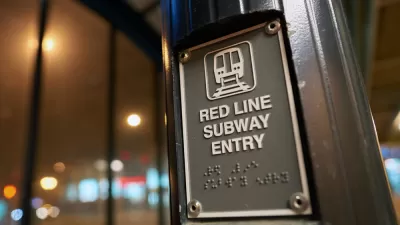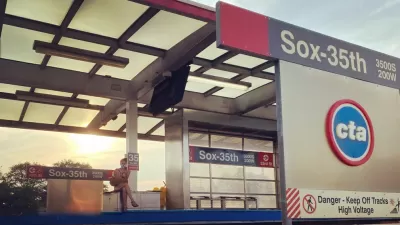A big approval and a significant delay—but otherwise 2020 has been a positive year for plans to extend the Chicago Transit Authority's Red Line by 5.6 miles to the south.

"The Chicago Transit Authority’s planned Red Line extension has made a 'significant' step toward securing about $1 billion in federal funds, the transit agency announced Monday," reports Stefano Esposito.
The $1 billion in necessary federal funding became a significant step closer to reality after the Federal Transit Administration gave preliminary approval for the extension that will add 5.6 miles to the Red Line, extending south of the Chicago city limits.
"The CTA now has two years to complete the next phase, which includes finalizing the project’s environmental impact statement and drawing up preliminary engineering documents," according to Esposito.
The step forward for the extension was cut with a step back, as Chicago Transit Authority officials announced that the timeline for the project's completion had been pushed back by three years, with an expected opening data now set for 2029.
Other than the delay, the extension's prospects are looking much more certain. Here's how a separate article by John Greenfield sums up the political dynamics influencing the project's future now:
Of course, even the 2029 start date assumes that the feds will come through with the $1 billion grant. But that possibility became a lot more likely with the election of Joe Biden, a noted rail fan. His appointment of former South Bend mayor Pete Buttigieg, who advocated for the extension of the South Shore Line commuter railroad into that city’s downtown, and rented a condo next door to the the [sic] Red Line’s Monroe station when he lived in Chicago in the late 2000s, probably won’t hurt either.
Planetizen last checked in with the plan in November 2020, after the release of the CTA's preferred plan for the extension's tracks and stations.
FULL STORY: CTA takes ‘significant’ step toward securing funding for Red Line extension

Maui's Vacation Rental Debate Turns Ugly
Verbal attacks, misinformation campaigns and fistfights plague a high-stakes debate to convert thousands of vacation rentals into long-term housing.

Planetizen Federal Action Tracker
A weekly monitor of how Trump’s orders and actions are impacting planners and planning in America.

In Urban Planning, AI Prompting Could be the New Design Thinking
Creativity has long been key to great urban design. What if we see AI as our new creative partner?

King County Supportive Housing Program Offers Hope for Unhoused Residents
The county is taking a ‘Housing First’ approach that prioritizes getting people into housing, then offering wraparound supportive services.

Researchers Use AI to Get Clearer Picture of US Housing
Analysts are using artificial intelligence to supercharge their research by allowing them to comb through data faster. Though these AI tools can be error prone, they save time and housing researchers are optimistic about the future.

Making Shared Micromobility More Inclusive
Cities and shared mobility system operators can do more to include people with disabilities in planning and operations, per a new report.
Urban Design for Planners 1: Software Tools
This six-course series explores essential urban design concepts using open source software and equips planners with the tools they need to participate fully in the urban design process.
Planning for Universal Design
Learn the tools for implementing Universal Design in planning regulations.
planning NEXT
Appalachian Highlands Housing Partners
Mpact (founded as Rail~Volution)
City of Camden Redevelopment Agency
City of Astoria
City of Portland
City of Laramie




























